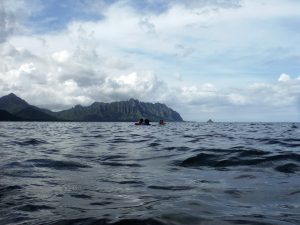
The full program of the concluding conference of Transcending Barriers
The National Center for Science and Civic Engagement (NCSCE) at Stony Brook University has received a grant to establish and advance robust partnerships between indigenous peoples and local formal and informal educators to improve educational outcomes for all students, promote cultural understanding, and foster long-term collaborations on issues of common concern. The program will extend the successful Hawai’i SENCER State strategy to Alaska and four state pilot projects. Local environmental and health issues will provide context for inquiry-based learning that transcends perceived conflicts between indigenous, local, and “Western” knowledge systems.
SENCER (Science Education for New Civic Engagements and Responsibilities), which connects civic issues to STEM content, encourages the incorporation of different perspectives, pushes students to critically analyze preconceptions, and actively engages learners in authentic research.
Cultural collaboration is not merely the awareness of traditions other than one’s own. It requires a deep understanding of and appreciation for the strengths that multiple perspectives bring to solving the complex, contested issues facing all communities. This includes recognizing the impact of past injustices and conflicts that indigenous people have experienced as well as a grounding in the cultural connections of relationships with the environment, traditions, and sacred spaces.
Leadership
Program Leadership
- Principal Investigator (PI): Dr. Eliza Reilly, executive director of NCSCE and Research Professor at Stony Brook University
- Co-PIs: Dr. Lawrence Duffy (University of Alaska Fairbanks), Dr. Robert Franco (Kapi’olani Community College), and Dr. Ulla Hasager (University of Hawai’i at Manoa)
- Chair of Advisory Board: Dr. Amy Shachter (Santa Clara University)
Pilot Projects
Click here to read about the selected pilot projects.
- Humboldt State University + Karuk Tribe of California Department of Natural Resources: Amy Sprowles, Assistant Professor, Biological Sciences, Humboldt State University; Lisa Hillman, Pikyav Field Institute Program Manager, Karuk Tribe of California Department of Natural Resources; and Leaf Hillman, Director of Natural Resources and Environmental Policy, Karuk Tribe of California Department of Natural Resources
- Northern Arizona University + Sustainable Nations Development Project: Denielle Perry, Assistant Professor, School of Earth Sciences and Environmental Sustainability, Northern Arizona University; and PennElys Droz, Ecological Designer/Builder, Sustainable Nations Development Project
- Salish Kootenai College + Watershed Education Network: Jonathon Richter, Lead Instructor and Dept Chair, Media Design, Film, & Television, Salish Kootenai College; Deb Fassnacht, Executive Director, Watershed Education Network; Holly Truitt, Founding Director, University of Montana Broader Impacts Group, University of Montana; and Mike Durglo, Jr., Division of Environmental Protection Manager and Climate Change Planning Coordinator, Confederated Salish and Kootenai Tribes
Photograph courtesy of Dave Krupp
